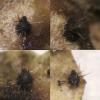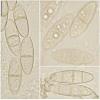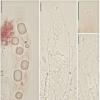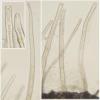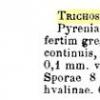
28-02-2026 14:43
A new refrence desired :Svanidze, T.V. (1984) Novy

01-03-2026 18:02
 Francois Guay
Francois Guay
I found this mystery Helotiales on an incubated le

01-03-2026 14:10
 Antonio Couceiro
Antonio Couceiro
Hola, me gustaria conocer opiniones sobre este tem

01-03-2026 18:46
 Robin Isaksson
Robin Isaksson
Hi! This species i se from time to time in the

01-03-2026 08:55
 Michel Hairaud
Michel Hairaud
Bonjour , Je souhaiterais recevoir cet article :�

01-03-2026 15:31
 Csaba Németh
Csaba Németh
Hello!I found these apothecia on Homalothecium lue

01-03-2026 17:51
 Bruno Coué
Bruno Coué
Bonjour,sur vieilles crottes de sanglier en chambr
Pyreno on Peltigera
Gernot Friebes,
20-12-2011 11:27
T. Richter found an interesting pyrenomycete growing on old thalli of Peltigera sp. (mainly on the underside). At first it was thought to be Capronia peltigerae but the microscopical data exclude this genus: asci are thin-walled with an apical ring, the hamathecium consists of abundant hyaline, many-septate paraphyses-like elements and the hairs are light brown and pseudo-septate. Furthermore, ascospores are light brown, 1-3-septate, up to 30 µm long (sometimes even a bit longer) and finely verrucouse when mature. I could not find something similar in literature so we hope you can help us.
Best wishes,
Gernot
PS.: We also found something related to Pezizella epithallina but we are not sure if our find really matches this species. Does anybody have experience with this tiny discomycete?
PPS.: I forgot that it is possible now to attach severeal photos to one post. :-)
Martin Bemmann,
20-12-2011 11:38
Gernot Friebes,
20-12-2011 11:50
Re : Pyreno on Peltigera
thank you! I already used this key but I didn't find any species that would fit. Trichosphaeria lichenum is described with hyaline, 6-9 x 2 µm big ascospores, so quite different from what we found.
Best wishes,
Gernot
Best wishes,
Gernot
Alain GARDIENNET,
20-12-2011 14:14
Re : Pyreno on Peltigera
Yes, it isn't Capronia peltigerae, as you have said. It isn't T. lichenum too. Interesting ! I will look for it.
For the disco, have you seen Hawksworth's key ?
Alain
Javier Etayo,
20-12-2011 17:45
Re : Pyreno on Peltigera
Hi Gernot,
I have seen many fungi species growing on Peltigera but not with the asci, spores and hairs you show us. I can not find a name for the genus.
Best wishes. Javier Etayo
I have seen many fungi species growing on Peltigera but not with the asci, spores and hairs you show us. I can not find a name for the genus.
Best wishes. Javier Etayo
Björn Wergen,
20-12-2011 17:57

Re : Pyreno on Peltigera
Very interesting. The combination of the hairy perithecia with the spore size and form is also interesting for me. If someone has a digital version of Hawksworth (1980), I would be interested in it!
regards,
björn
regards,
björn
Alain GARDIENNET,
20-12-2011 18:05
Re : Pyreno on Peltigera
Yes interesting by having apical ring in ascus and paraphyses (s.l.). Perhaps it's new. I'm looking around non-lichenicolous species, but I don't find any track to follow.
Kazama-Björn, I send you jpg pages of Hawksworth 1980.
Alain
Kazama-Björn, I send you jpg pages of Hawksworth 1980.
Alain
Björn Wergen,
21-12-2011 00:05

Re : Pyreno on Peltigera
Hi again,
I think Acanthostigma peltigerae (Fuckel) G. Winter has some similarities with your finding, it has a colour plate in BERLESE 1 (3), XCIX, descr. p. 102, "sp. 17-20x6-7µm".
That was just an idea ;)
best wishes,
björn
I think Acanthostigma peltigerae (Fuckel) G. Winter has some similarities with your finding, it has a colour plate in BERLESE 1 (3), XCIX, descr. p. 102, "sp. 17-20x6-7µm".
That was just an idea ;)
best wishes,
björn
Gernot Friebes,
21-12-2011 00:24
Re : Pyreno on Peltigera
Hi,
thank you all! Luckily we have enough material left for further examination.
@Alain: Yes, I have seen the description by Hawksworth but its not easy to compare it living material.
@Björn: Acanthostigma peltigerae is a synonym of Capronia peltigerae which isn't really close to our find.
Best wishes,
Gernot
thank you all! Luckily we have enough material left for further examination.
@Alain: Yes, I have seen the description by Hawksworth but its not easy to compare it living material.
@Björn: Acanthostigma peltigerae is a synonym of Capronia peltigerae which isn't really close to our find.
Best wishes,
Gernot
Luc Bailly,
21-12-2011 00:54
Re : Pyreno on Peltigera
Hi Gernot,
Looks like a great find, indeed.
Alain, peux-tu m'envoyer la clé de Hawksworth 1980?, comme ça, je pourrais fouiner sur les Peltigera aussi.
Amitiés, joyeuses fêtes - LUC.
Looks like a great find, indeed.
Alain, peux-tu m'envoyer la clé de Hawksworth 1980?, comme ça, je pourrais fouiner sur les Peltigera aussi.
Amitiés, joyeuses fêtes - LUC.
Gernot Friebes,
21-12-2011 08:40
Re : Pyreno on Peltigera
Hi Luc,
the key is available on Cyberliber: http://www.cybertruffle.org.uk/cyberliber/59351/0074/002/0363.htm
Best wishes,
Gernot
the key is available on Cyberliber: http://www.cybertruffle.org.uk/cyberliber/59351/0074/002/0363.htm
Best wishes,
Gernot
Luc Bailly,
21-12-2011 16:46
Re : Pyreno on Peltigera
Ah, alright. Thanks, Gernot.
Sabine Huhndorf,
22-12-2011 15:17
Re : Pyreno on Peltigera
Hello Gernot,
What you have is a member of the Helminthosphaeriaceae. Jacques Fournier, Andy Miller and I are in the middle of doing a revision on some members of this group, expanding the concepts of some of the genera. It appears to be similar to two species we have observed: Chaetosphaeria flavocompta (Berk. & M.A. Curtis) Sacc.? and Chaetosphaeria ludens Morg. Both will be transferred to Helminthosphaeria in the upcoming paper. Full measurements are needed to determine whether it matches either of these or is another species altogether.
It is a very fine looking species and your images are excellent!
Best regards,
Sabine Huhndorf
What you have is a member of the Helminthosphaeriaceae. Jacques Fournier, Andy Miller and I are in the middle of doing a revision on some members of this group, expanding the concepts of some of the genera. It appears to be similar to two species we have observed: Chaetosphaeria flavocompta (Berk. & M.A. Curtis) Sacc.? and Chaetosphaeria ludens Morg. Both will be transferred to Helminthosphaeria in the upcoming paper. Full measurements are needed to determine whether it matches either of these or is another species altogether.
It is a very fine looking species and your images are excellent!
Best regards,
Sabine Huhndorf
Alain GARDIENNET,
22-12-2011 20:25
Re : Pyreno on Peltigera
René,
The link is perhaps not the good one because here it was a Pleosporaceae.
Sabine, your information is really interesting because sometimes we meet such species.
Best regards,
Alain
The link is perhaps not the good one because here it was a Pleosporaceae.
Sabine, your information is really interesting because sometimes we meet such species.
Best regards,
Alain
Gernot Friebes,
23-12-2011 01:29
Re : Pyreno on Peltigera
Hi Sabine,
thank you very much for your answer! I add a complete description of our find:
Ascomata: originating from the upper and lower surface of old lichen thalli; 250-350 µm in diameter, 350-450 µm high; pyriform, with hardly visible central ostiole; surface dark brown to black, mat, somewhat uneven/rough or even partially cracked, with stiff, straight to somewhat curved, light hairs all over the surface. Perithecial wall: outer layer out of dark brown, ± thick walled, isodiametrical cells. Asci: unitunicate, cylindrical but narrowed towards the apex; 90-120 x 15-19 µm, shortly stipitate; 8-spored, ascospores irregularly arranged; apical apparatus as a disc, ca. 4 x 1,7-2 µm. Hamathecium: consists of several multi-septate, hyaline paraphyses, not exceeding the asci. Ascospores: 25-30(32) × 7,5-9 µm, ellipsoid, symetrical, ends obtuse or slightly tapering; at first with one transverse middle septum, when mature with 3 transverse septa, not or slightly constricted at septa; hyaline and smooth when young, later light brown and finely verrucous; filled with small guttules. Hairs: 150-220(-250) x 8-12 µm, straight to slightly bent, wall somewhat flexuous; ends obtuse; originating from a simple septa, not rooting; thick walled (3-3,5 µm) but with a thinner wall at the apex, pseudoseptate (without true septa); brown at the base, turning lighter toward the apex. Substrate: on old thalli of Peltigera cf. polydactylon, mainly on the lower surface but some ascomata also on the upper surface, often on whitish spots of the thallus.
Does it fit to one of these species of the Helminthosphaeriaceae?
Best wishes,
Gernot
thank you very much for your answer! I add a complete description of our find:
Ascomata: originating from the upper and lower surface of old lichen thalli; 250-350 µm in diameter, 350-450 µm high; pyriform, with hardly visible central ostiole; surface dark brown to black, mat, somewhat uneven/rough or even partially cracked, with stiff, straight to somewhat curved, light hairs all over the surface. Perithecial wall: outer layer out of dark brown, ± thick walled, isodiametrical cells. Asci: unitunicate, cylindrical but narrowed towards the apex; 90-120 x 15-19 µm, shortly stipitate; 8-spored, ascospores irregularly arranged; apical apparatus as a disc, ca. 4 x 1,7-2 µm. Hamathecium: consists of several multi-septate, hyaline paraphyses, not exceeding the asci. Ascospores: 25-30(32) × 7,5-9 µm, ellipsoid, symetrical, ends obtuse or slightly tapering; at first with one transverse middle septum, when mature with 3 transverse septa, not or slightly constricted at septa; hyaline and smooth when young, later light brown and finely verrucous; filled with small guttules. Hairs: 150-220(-250) x 8-12 µm, straight to slightly bent, wall somewhat flexuous; ends obtuse; originating from a simple septa, not rooting; thick walled (3-3,5 µm) but with a thinner wall at the apex, pseudoseptate (without true septa); brown at the base, turning lighter toward the apex. Substrate: on old thalli of Peltigera cf. polydactylon, mainly on the lower surface but some ascomata also on the upper surface, often on whitish spots of the thallus.
Does it fit to one of these species of the Helminthosphaeriaceae?
Best wishes,
Gernot
Sabine Huhndorf,
23-12-2011 12:59
Re : Pyreno on Peltigera
Hi Gernot,
The ascospores of your collection are somewhat larger than either of the two species I suggested. Because of the ascospore size, the lichen substrate and the amount and kind of ascomatal hairs, I believe that it is an undescribed species of Helminthosphaeria.
Is there a collection number and locality data?
Cheers,
Sabine
The ascospores of your collection are somewhat larger than either of the two species I suggested. Because of the ascospore size, the lichen substrate and the amount and kind of ascomatal hairs, I believe that it is an undescribed species of Helminthosphaeria.
Is there a collection number and locality data?
Cheers,
Sabine
Sabine Huhndorf,
23-12-2011 13:13
Re : Pyreno on Peltigera
Hello René?,
I located the AscoFrance post (Setose pyrenomycetes, Hans-Otto Baral, 08-05-2011 21:42) and the specimen you are referring to is indeed a member of Helminthosphaeria. Jacques Fournier was correct in his reply to that post, in suggesting that it is similar to collections formerly placed in Lasiosphaeria stuppea and Lasiosphaeria coacta. These are of course not true Lasiosphaeria. Your collection may be similar to the one posted by Gernot or maybe be close something similar in our collection that was sent to us by Thomas Laessoe. Your collection would have to be examined and compared.
I located the AscoFrance post (Setose pyrenomycetes, Hans-Otto Baral, 08-05-2011 21:42) and the specimen you are referring to is indeed a member of Helminthosphaeria. Jacques Fournier was correct in his reply to that post, in suggesting that it is similar to collections formerly placed in Lasiosphaeria stuppea and Lasiosphaeria coacta. These are of course not true Lasiosphaeria. Your collection may be similar to the one posted by Gernot or maybe be close something similar in our collection that was sent to us by Thomas Laessoe. Your collection would have to be examined and compared.
Best regards,
Sabine
Gernot Friebes,
23-12-2011 14:25
Re : Pyreno on Peltigera
Hi Sabine,
the specimen in my herbarium has the number "GF 20110224". T. Richter also has a specimen in his herbarium but I don't know his collection number yet, if you want I'll ask him. In case of a new species I can deposit it in herbarium GJO.
Here are the data of the collections we examined:
15.X.2011 & 11.XII.2011. Germany, Mecklenburg-Vorpommern, district Nordwestmecklenburg; south of Rehna, 1 km north of Stresdorf, former gravel pit; on dying thalli of Peltigera cf. polydactylon. Leg.: T. Richter.
Best wishes,
Gernot
the specimen in my herbarium has the number "GF 20110224". T. Richter also has a specimen in his herbarium but I don't know his collection number yet, if you want I'll ask him. In case of a new species I can deposit it in herbarium GJO.
Here are the data of the collections we examined:
15.X.2011 & 11.XII.2011. Germany, Mecklenburg-Vorpommern, district Nordwestmecklenburg; south of Rehna, 1 km north of Stresdorf, former gravel pit; on dying thalli of Peltigera cf. polydactylon. Leg.: T. Richter.
Best wishes,
Gernot
Gernot Friebes,
29-12-2011 23:54
Re : Pyreno on Peltigera
Hi Yan,
I didn't observe any reaction with Lugol.
Best wishes,
Gernot
I didn't observe any reaction with Lugol.
Best wishes,
Gernot

